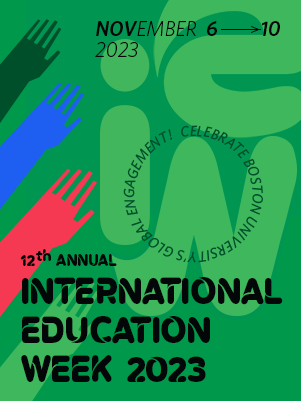Ebola and Boston University
Update: April 23, 2015
While it appears the Ebola crisis in West Africa may finally be on the wane, the Centers for Disease Control (CDC) still recommends that U.S. residents avoid nonessential travel to Sierra Leone, Guinea, and Liberia. The recommendations below reflect the advice provided throughout the crisis by the CDC, the Massachusetts Department of Public Health, and other sources. Boston University still recommends that any traveler from those regions, or those contemplating travel to those regions, follow these recommendations.
January 8, 2015
To the Boston University Community:
We would like to remind all members of the BU community that the health and safety of our community is of highest importance to us. Despite the fact that Boston University and the New England area have not seen any incidents of the Ebola virus to date, Boston University remains vigilant and continues to review our preparations for dealing with any outbreak of disease.
Risk of Ebola to the Campus and Community
The risk of an Ebola outbreak in the Boston University community remains very low. Since the beginning of the outbreak in West Africa several months ago there has been very little travel by BU students, faculty or staff to the affected countries or to BU by visitors from those countries, and no one at Boston University has been identified as being at high risk. While it is likely that isolated cases of Ebola will still be identified in the U.S., Boston University and public health authorities are confident that such cases will be contained through robust response and treatment. We want to share resources available to you and the safety measures we have put into place to ensure the risk remains low.
Travel to Countries Affected by Ebola
Currently, Guinea, Liberia and Sierra Leone are considered high-risk destinations as defined by the State Department, the Centers for Disease Control, and the Boston University International Travel Risk Policy. We ask that all non-essential travel to these destinations be deferred at this time.
If you are planning to travel to other African countries that have reported smaller Ebola outbreaks in recent months, such as Nigeria, you are encouraged to follow the enhanced precautions recommended by the CDC.
For more information on health and safety considerations for travel abroad, please contact Kevin Kugel, Associate Director, Health, Safety and Security kkugel@bu.edu. Please also refer to Global Programs Health and Safety News.
Travelers Returning to Campus
If you recently visited any of the affected countries, you should be aware that the incubation period for Ebola virus disease is 2-21 days. If you have been in Guinea, Liberia or Sierra Leone, in the three weeks preceding your return, you must contact one of the following offices for a telephone assessment before returning to campus. If you are concerned that you may have been exposed to the Ebola virus and are experiencing symptoms, you must call one of the following numbers, a doctor, or the nearest emergency room immediately:
- Students: Student Health Services, 617-353-3575 (24 hours)
- Faculty and staff (CRC and MED): Occupational Health Center, 617-353-6630 (Weekdays 9AM – 5PM)
- Research faculty and staff: Research Occupational Health Program, 617-414-7647 (Weekdays 9AM – 5PM)
- Boston University Police Department 617-353-2121 (24 hours)
Please be aware that you should always call before arriving at a medical facility to let them know the nature of your possible exposure.
Study Abroad Programs
Boston University closely monitors news and alerts concerning countries where Study Abroad programs operate. Global Programs and Student Health Services have implemented an Ebola Monitoring and Response Protocol for each of Boston University’s Study Abroad sites. No changes to the operation or schedule of Spring 2015 Study Abroad programs are anticipated; any changes will be communicated to students and parents.
University Preparations
Boston University Student Health Services, Occupational Health, and Research Occupational Health are working closely with the Boston Medical Center and the Boston Public Health Commission to prepare and implement best practices to protect the BU community. Many lessons have been learned from the first U.S. cases and, following well-established practice, BU health professionals, first responders, and administrators follow these lessons closely in order to refine BU’s own response preparations.
Resources
Boston Public Health Commission
Centers for Disease Control Ebola Updates
Please be assured that Boston University regularly trains and prepares for a variety of emergencies including Ebola. We take the safety of our entire community very seriously.




